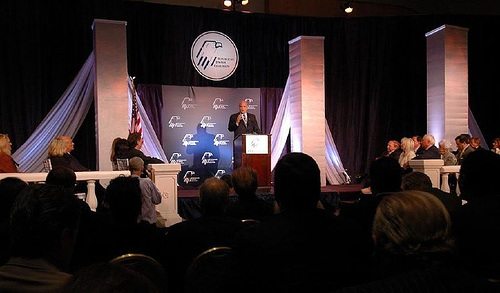
August 20, 2012; Source: ProPublica
Sign up for our free newsletters
Subscribe to NPQ's newsletters to have our top stories delivered directly to your inbox.
By signing up, you agree to our privacy policy and terms of use, and to receive messages from NPQ and our partners.
Kim Barker of the nonprofit public interest journalism outfit ProPublica has undertaken a major investigative report on the role of 501(c)(4) “social welfare organizations” in modern American elections. Regular readers of the NPQ Newswire should be familiar with these organizations that are able to offer donors a veil of secrecy so long as they can say that their aim is “primarily” focused on their stated social welfare activities. Barker takes readers inside a meeting of one such 501(c)(4) social welfare organization, the Republican Jewish Coalition, where the group’s executive director woos potential donors around the table with this pitch obviating the need for any sort of courage: “Contributions to the RJC are not reported…We don’t make our donors’ names available. We can take corporate money, personal money, cash, shekels, whatever you got.”
For anyone who’s not yet clear on how we got to this point, Barker’s full report is a must read. For those who already have the backstory here, the report is nonetheless of interest for Barker’s many examples of potentially actionable contradictions from 501(c)(4)s, such as these three:
- “Consider the American Action Network, which reported spending $25.7 million on its 2010 tax return. The group told the IRS the bulk of that money, $17 million, went for lobbying and only $5 million went to political activity. But that same year, it told the FEC it spent more than $19 million on ads.”
- “The Commission on Hope, Growth and Opportunity paid for a series of ads in 2010 that cost an estimated $2.3 million, according to CMAG. One portrayed a cartoon dance line featuring Obama, Pelosi and an interchangeable Democrat, depending on where the ad ran. ‘Folks in Washington are living it up,’ it said. The ad urged viewers to ‘join’ the Republican challenger. Still, the group reported no spending to the FEC. In its 2010 tax return, it said it put at least $4.6 million — 96 percent of its total expenditures — into advertising, yet insisted it spent nothing to influence elections. The Commission on Hope, Growth and Opportunity now appears dormant. Calls and emails to the group went unanswered.”
- “Another group, the Revere America Association, launched with the help of former Republican New York Gov. George Pataki, told the IRS in May 2010 that it wouldn’t spend money to influence elections. But in its 2010 tax return, Revere America said it spent about $2.5 million on political ads. Marianne Zuk, the group’s president, did not return calls or emails about the discrepancy. In a brief interview in December, she said the group was ‘in the process of winding down.’ Zuk said a new social welfare nonprofit, Partnership for America, had taken over Revere America’s activities.
There are many more, but ProPublica paints the picture that a fundamental assumption of many of these groups is that they can disband (perhaps even to regroup under a new name) before regulators have time to check on whether what they’re doing is particularly “social welfare”-oriented. NPQ’s stance on this matter has already been articulated by our national correspondent, Rick Cohen, who noted, “The needs of American voters to know who is trying to buy the elections should outweigh…the nonprofit sector’s inviolable need for donor privacy.” As such, we hope that ProPublica’s work helps the IRS find the will and the way to get serious about bringing accountability to groups that are largely “social welfare” organizations in name only. It is long past time for a sheriff to stand up in this “wild West” town of secret campaign finance. The integrity of our democracy depends on it. –Mike Keefe-Feldman













